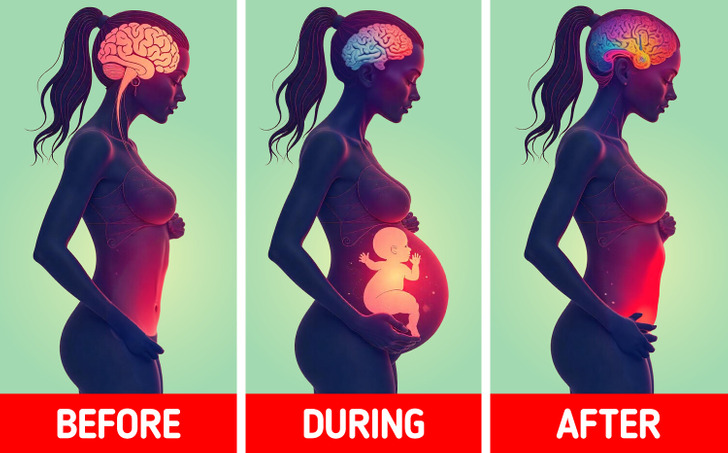Pregnancy Permanently Alters the Brain, Science Finds / Bright Side
Pregnancy is oftentimes seen as a period of profound change, but while the physical transformations take center stage, there’s an equally intriguing shift happening in the brain. Recent studies show that pregnancy reshapes the brain in extraordinary ways, boosting your capacity to connect with, care for, and respond to your baby. Here’s what the research uncovers about “baby brain”—and why it’s far more complex than the stereotype suggests.
By as early as 9 weeks into pregnancy, your brain starts undergoing significant changes.

Scientists have found that out of 400 brain regions studied, 80% show a reduction in gray matter, particularly in areas involved in understanding emotions and building social connections. While this “pruning” process might seem concerning, it indicates that the brain is becoming more efficient. Dr. Elseline Hoekzema, head of the Pregnancy and the Brain Lab at Amsterdam University Medical Center explains that these changes are closely tied to maternal instincts. “Brain changes during pregnancy relate to the way a mother’s brain and body react to infants,” she says.
These neurological adjustments aren’t solely about bonding with your baby—they also prepare you to handle the emotional and social challenges of parenting, such as staying calm through sleepless nights or interpreting your baby’s cries.
Misplacing keys, experiencing mental fog, or occasional forgetfulness—many expectant mothers often joke about having a “baby brain.”
The reality behind this phenomenon is far more inspiring than inconvenient. As pregnancy hormones like estrogen and progesterone surge through your body, they reshape critical areas of the brain, particularly those responsible for empathy and emotional processing.
Dr. Emily Jacobs, a neuroscientist at the University of California, Santa Barbara, explains that these changes are designed to make the brain more specialized for motherhood. She emphasizes that the reduction in brain volume during pregnancy is not a negative occurrence. Instead, she likens it to a sculptor refining marble to reveal something extraordinary. “You can see the sculpting of the brain unfold week by week,” she says.
Although pregnancy hormones play a key role in these changes, they’re only part of the equation.

Parenthood isn’t limited to biological mothers. Fathers, adoptive parents, and other caregivers also exhibit nurturing behaviors as their brains adjust to the demands of caregiving. Parenting researcher Dr. Jonny Kohl highlights that the brain starts preparing for the transition to parenthood much earlier than commonly believed. He further explains that human parenting is highly complex, shaped by education, observational learning, and a range of environmental influences.
Pregnancy hormones open a unique “window of learning.”
Researchers suggest that pregnancy enhances the brain’s sensitivity to signals from your baby. Dr. Ronald Dahl, a neuroscientist at the University of California, Berkeley, explains that pregnancy hormones trigger neurological changes, shifting priorities and motivations.
These changes “sensitize individuals to learn adaptive things and create bonds and develop greater expertise in responding to an infant.” Even white matter, the brain’s communication network, undergoes improvements during pregnancy. It becomes more streamlined, akin to smoothing out a bumpy road, which enhances the brain’s ability to coordinate its functions and stay closely attuned to a baby’s needs.
These changes extend well beyond childbirth.

Some brain changes, such as enhancements in white matter, diminish after childbirth, while others have a more lasting impact. For example, the reduction in gray matter volume in specific regions can remain for up to two years postpartum.
Dr. Jacobs describes these transformations as “permanent etchings in the brain,” intended to heighten a mother’s emotional sensitivity and responsiveness to her child. Remarkably, researchers discovered these changes were so pronounced that they successfully trained a computer to determine whether a woman was pregnant based solely on her brain scans.

If you’re an expectant mother, remember this: those moments of forgetfulness or heightened emotions are not signs of a failing mind—they’re evidence of your brain’s remarkable ability to adapt and evolve. Recognizing these changes can offer reassurance, especially during challenging periods such as managing the mental demands of parenting or dealing with postpartum difficulties. As Dr. Jacobs explains, “The brain is tuned to prioritize information that helps you care for your baby.”
So, the next time someone jokes about “baby brain,” take pride in it. It’s not a weakness—it’s a testament to the extraordinary ways your brain is preparing you for motherhood.
As your brain undergoes remarkable adaptations during pregnancy, another intriguing factor comes into focus. Research suggests that stress levels might play a role in determining your baby’s gender. Let’s explore this fascinating finding in more detail.




